人教版(2019)高中英语必修第一册 Unit5Languages around the world Review 名师课件(共23张PPT)
文档属性
| 名称 | 人教版(2019)高中英语必修第一册 Unit5Languages around the world Review 名师课件(共23张PPT) |
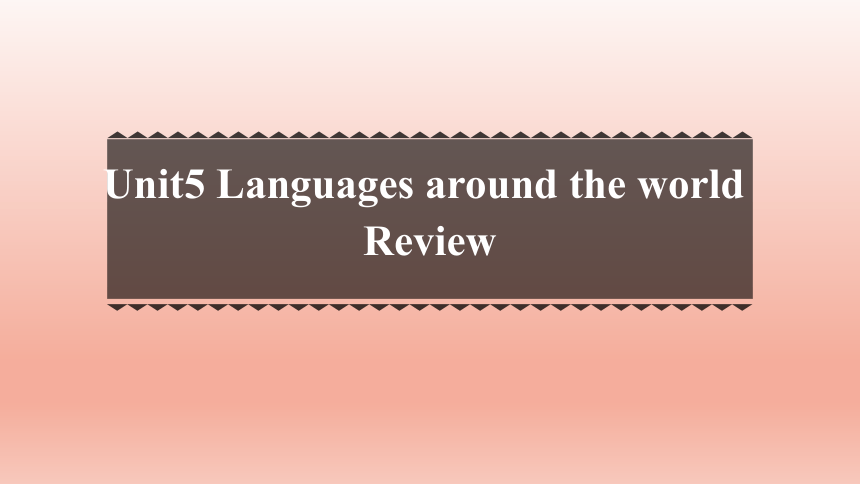
|
|
| 格式 | pptx | ||
| 文件大小 | 1.1MB | ||
| 资源类型 | 教案 | ||
| 版本资源 | 人教版(2019) | ||
| 科目 | 英语 | ||
| 更新时间 | 2023-03-09 00:00:00 | ||
图片预览

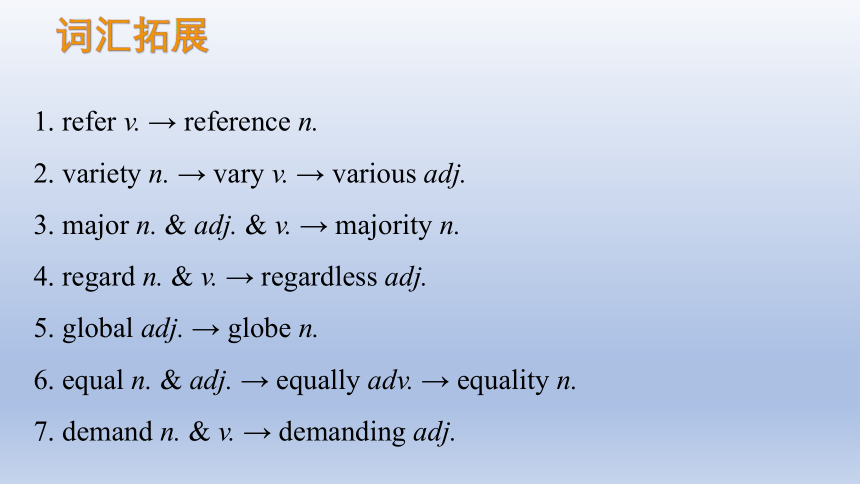

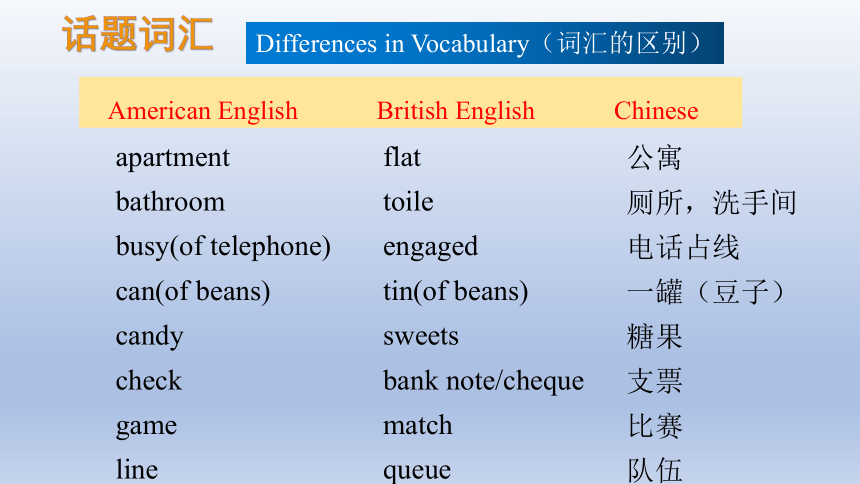
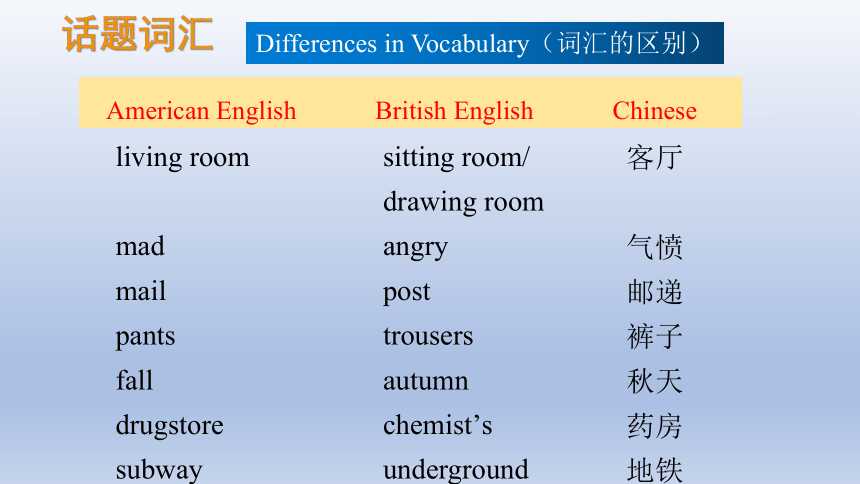
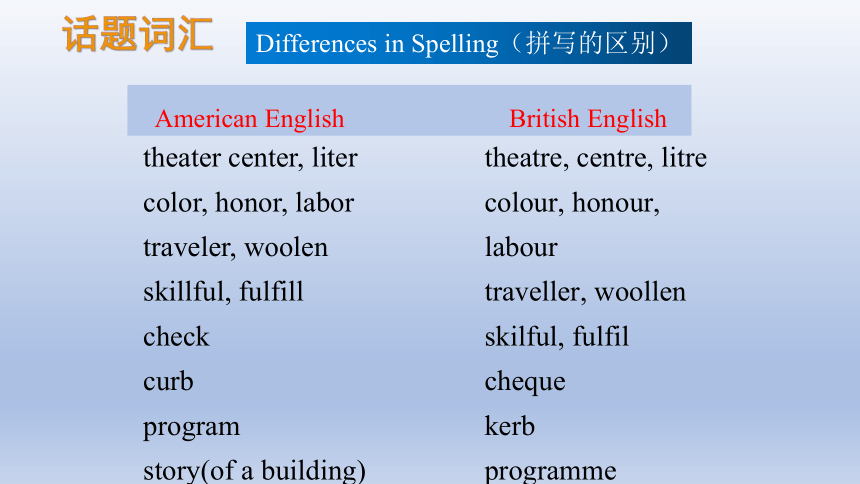
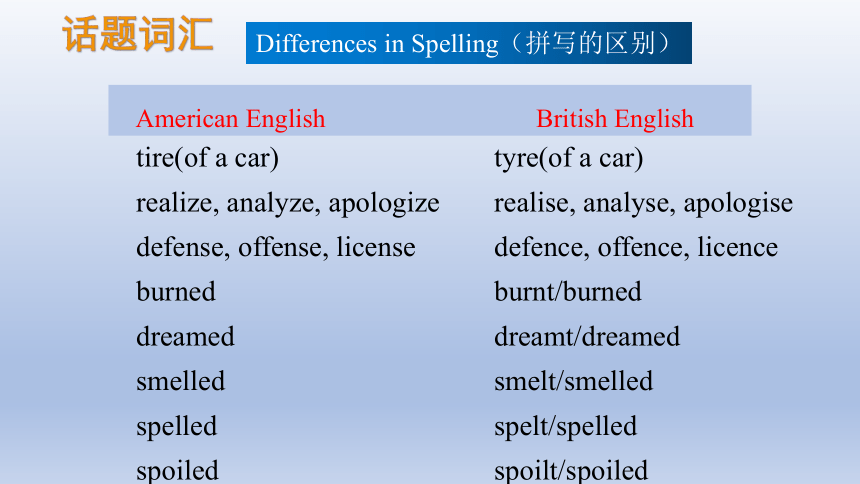
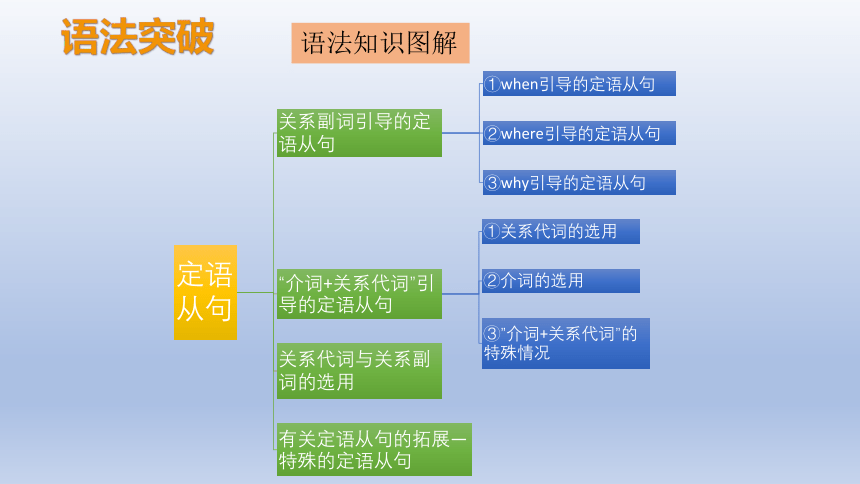
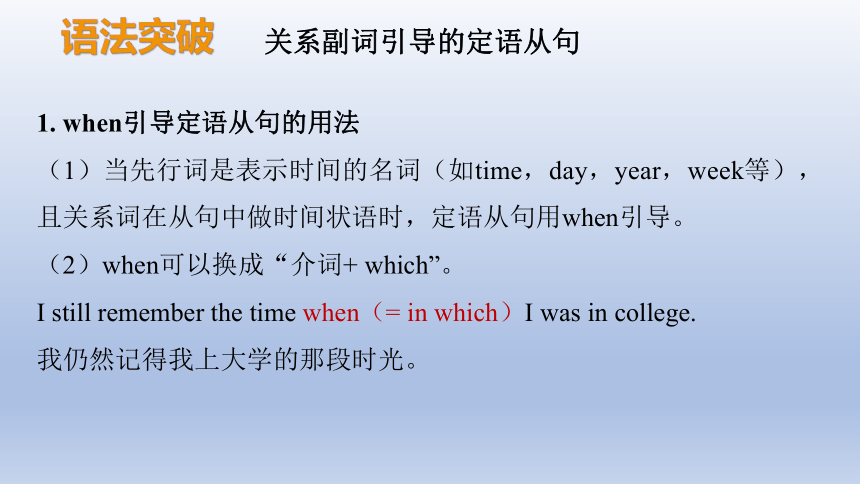
文档简介
(共23张PPT)
Unit5 Languages around the world
Review
词汇拓展
1. refer v. → reference n.
2. variety n. → vary v. → various adj.
3. major n. & adj. & v. → majority n.
4. regard n. & v. → regardless adj.
5. global adj. → globe n.
6. equal n. & adj. → equally adv. → equality n.
7. demand n. & v. → demanding adj.
词汇拓展
8. describe v. → description n.
9. appreciate v. → appreciative adj. → appreciation n.
Thanks so much for your help. I really appreciate it. Your teaching method helps children to develop the ability to appreciate poetry and literature. We have been always appreciative of your help. Words fail to express my appreciation to you. 非常感谢你的帮助,我不胜感激。你的教学方法帮助孩子们培养了鉴赏诗歌和文学的能力。我们对你的帮助一直心存感激。语言无法表达我对你的感激之情。
话题词汇
apartment
bathroom
busy(of telephone)
can(of beans)
candy
check
game
line
Differences in Vocabulary(词汇的区别)
American English British English Chinese
flat
toile
engaged
tin(of beans)
sweets
bank note/cheque
match
queue
公寓
厕所,洗手间电话占线
一罐(豆子)糖果
支票
比赛
队伍
话题词汇
living room
mad
mail
pants
fall
drugstore
subway
Differences in Vocabulary(词汇的区别)
American English British English Chinese
sitting room/
drawing room
angry
post
trousers
autumn
chemist’s
underground
客厅
气愤
邮递
裤子
秋天
药房
地铁
话题词汇
theater center, liter color, honor, labor
traveler, woolen
skillful, fulfill
check
curb
program
story(of a building)
Differences in Spelling(拼写的区别)
American English British English
theatre, centre, litre colour, honour, labour
traveller, woollen skilful, fulfil
cheque
kerb
programme
storey(of a building)
话题词汇
tire(of a car)
realize, analyze, apologize
defense, offense, license
burned
dreamed
smelled
spelled
spoiled
Differences in Spelling(拼写的区别)
American English British English
tyre(of a car)
realise, analyse, apologise
defence, offence, licence
burnt/burned dreamt/dreamed smelt/smelled
spelt/spelled spoilt/spoiled
语法突破
语法知识图解
1. when引导定语从句的用法
(1)当先行词是表示时间的名词(如time,day,year,week等),且关系词在从句中做时间状语时,定语从句用when引导。
(2)when可以换成“介词+ which”。
I still remember the time when(= in which)I was in college.
我仍然记得我上大学的那段时光。
语法突破
关系副词引导的定语从句
当先行词是表示时间的名词时,既可以用when引导定语从句,也可以用that或which引导定语从句,关键要看关系词在定语从句中做何种成分。若关系词在定语从句中充当状语,则用when引导;若关系词在定语从句中充当主语或宾语,则用that或 which引导。
Do you remember the days that/which we spent together on the farm?(that或 which做 spent的宾语)
你记得我们一起在农场度过的那些日子吗?
语法突破
关系副词引导的定语从句
NOTES
2. where引导定语从句的用法
(1)当先行词是表示地点的名词(如place,mom,mountain,airport等),且关系词在从句中做地点状语时,定语从句用where引导。
(2)where可以换成“介词+ which”。
This is the hotel where(= in which)they stayed.
这就是他们住过的旅馆。
语法突破
关系副词引导的定语从句
①如果先行词为表示抽象地点的名词(如 state,condition,point,situation等),且关系词在定语从句中做地点状语,关系词用 where。
We have reached a point where a change is needed.
我们已经到了需要作出改变的地步。
②当先行词为地点名词时,如果代替先行词的关系词在定语从句中做主语或宾语,则用that或which引导定语从句。
His father works in a factory which/that makes radio parts.
他的父亲在一家生产收音机零件的工厂里工作。
语法突破
关系副词引导的定语从句
NOTES
① where引导定语从句时,它是关系副词,在定语从句中做地点状语,其前有一个表示地点的先行词。此时,where可以换成“介词+ which”结构。where引导的定语从句只能位于主句之后或句中,不能位于句首。
语法突破
where引导的定语从句和状语从句
② where引导状语从句时,where为从属连词。where引导的地点状语从句修饰主句中的谓语动词,where前面没有表示地点的名词。此时,here不能换成“介词+ which”结构。where引导的地点状语从句可位于主句之前,也可位于主句之后。
辨析比较
3. why引导定语从句的用法
(1)当先行词是表示原因的名词 reason,且关系词在从句中做原因状语时,定语从句用why引导,且只能引导限制性定语从句。
(2)why可以用 for which来代替。
This is the reason why(= for which)he left in a hurry.
这就是他匆匆离去的原因。
语法突破
关系副词引导的定语从句
若代替先行词 reason的关系词在定语从句中不做状语,而是充当主语或宾语,则用that或 which引导定语从句。
The reason that he told me yesterday is a lie.
昨天他告诉我的理由是个谎言。
1. 关系代词的选用
在此结构中,先行词指人时关系代词用whom,不能用who/that;先行词指物时关系代词用 which,不能用 that。
This is the ship by which I went to Shanghai.
这就是我去上海所乘的船。
语法突破
“介词+关系代词”引导的定语从句
2. 介词的选用
(1)根据定语从句中的谓语动词与介词的习惯搭配来确定介词。
Is this the car for which you paid a high price?
这就是你花高价买的车吗?(pay…for sth)
(2)根据定语从句中的主要形容词与介词的习惯搭配来确定介词。
He brought the result with which the boss was satisfied.
他带来了老板满意的结果。(be satisfied with)
(3)根据先行词与介词的习惯搭配来确定介词。先行词往往是表示时间、地点、原因、方式等的词。
语法突破
“介词+关系代词”引导的定语从句
语法突破
3. “介词+关系代词”的特殊情况
(1)介词可以后移,此时关系代词可以省略(省略时,介词必须后移)。
This is the book(which/that)you asked for. 这是你要的那本书。
“介词+关系代词”引导的定语从句
有些固定的动词短语一般不能拆开,介词仍放在动词的后面。
Is this the book(which/that)she is looking for?
这是她正在寻找的那本书吗?
(2)在“介词+关系代词”结构中,若介词短语表示位置,则定语从句往往用倒装语序。常见的这类短语有 at the foot of,at the back of,in front of,on the top of 等。
语法突破
3. “介词+关系代词”的特殊情况
(3)“名词(代词、数词)+介词of+关系代词”引导的定语从句通常是非限制性定语从句,该结构在定语从句中一般做主语。其中“名词+介词of+关系代词”有时可以用whose+名词”替换。
Her sons, both of whom work abroad, ring her up every week.
她的两个儿子都在国外工作,他们每周都给她打电话。
“介词+关系代词”引导的定语从句
语法突破
关系代词与关系副词的选用
方法 依据
根据从句的谓语动词 是及物动词,后面若无宾语,用关系代词;是不及物动词则用关系副词
根据先行词在从句中 所做的成分 把先行词放入定语从句中,若做主语或宾语用关系代词;做状语则用关系副词
定语从句的引导词用关系代词还是关系副词可以用以下两种方式判断:
语法突破
特殊的定语从句
特殊的定语从句 ①有些定语从句和先行词之间插入一个短语或别的成分,这种语言现象称为分裂式定语从句 ②带有插入语的定语从句 ③ where做名词可与from连用 ④no/never/not+先行词+but(准关系代词)= that...not=who…not没有……不 I have an aunt in London who never writes to me.
He went to the UK in 1988, where he studied English literature.
His head soon appeared out of one of the third storey windows, from where he could see what happened clearly.
Not a single person among us but supports the plan(= who doesn't support the plan).
There's not a student in my class but would(= who would not) like to learn a second foreign language.
语法巩固
1. I still remember the day ______/______ ______ I first met Jennifer.
2. I often think of the time ______/______ ______ I was In college.
3. This is the town ______/______ ______ Shakespeare was born.
4. He didn't tell us the reason ______/______ ______ he was so excited.
5. Who is the girl ______ ______ you just shook hands
6. He bought a telescope ______ ______ he could study the sky.
用适当的“介词+关系代词”或关系副词填空
when
on
which
when
in
which
where
in
which
why
for
which
with
whom
through
which
语法巩固
1. The advice is quite helpful. Professor Li gives it to me.
________________________________________________________
2. The books on the desk are prizes for us. The book’s covers are shiny.
________________________________________________________
3. Peter was late for class again. It made his teacher very angry.
________________________________________________________
将下列句子合并成定语从句
The advice (that/which) Professor Li gives to me is quite helpful.
The books on the desk, (whose) covers are shiny, are prizes for us.
Peter was late for class again, (which) made his teacher very angry.
完成教材P68E1-2.
Unit5 Languages around the world
Review
词汇拓展
1. refer v. → reference n.
2. variety n. → vary v. → various adj.
3. major n. & adj. & v. → majority n.
4. regard n. & v. → regardless adj.
5. global adj. → globe n.
6. equal n. & adj. → equally adv. → equality n.
7. demand n. & v. → demanding adj.
词汇拓展
8. describe v. → description n.
9. appreciate v. → appreciative adj. → appreciation n.
Thanks so much for your help. I really appreciate it. Your teaching method helps children to develop the ability to appreciate poetry and literature. We have been always appreciative of your help. Words fail to express my appreciation to you. 非常感谢你的帮助,我不胜感激。你的教学方法帮助孩子们培养了鉴赏诗歌和文学的能力。我们对你的帮助一直心存感激。语言无法表达我对你的感激之情。
话题词汇
apartment
bathroom
busy(of telephone)
can(of beans)
candy
check
game
line
Differences in Vocabulary(词汇的区别)
American English British English Chinese
flat
toile
engaged
tin(of beans)
sweets
bank note/cheque
match
queue
公寓
厕所,洗手间电话占线
一罐(豆子)糖果
支票
比赛
队伍
话题词汇
living room
mad
pants
fall
drugstore
subway
Differences in Vocabulary(词汇的区别)
American English British English Chinese
sitting room/
drawing room
angry
post
trousers
autumn
chemist’s
underground
客厅
气愤
邮递
裤子
秋天
药房
地铁
话题词汇
theater center, liter color, honor, labor
traveler, woolen
skillful, fulfill
check
curb
program
story(of a building)
Differences in Spelling(拼写的区别)
American English British English
theatre, centre, litre colour, honour, labour
traveller, woollen skilful, fulfil
cheque
kerb
programme
storey(of a building)
话题词汇
tire(of a car)
realize, analyze, apologize
defense, offense, license
burned
dreamed
smelled
spelled
spoiled
Differences in Spelling(拼写的区别)
American English British English
tyre(of a car)
realise, analyse, apologise
defence, offence, licence
burnt/burned dreamt/dreamed smelt/smelled
spelt/spelled spoilt/spoiled
语法突破
语法知识图解
1. when引导定语从句的用法
(1)当先行词是表示时间的名词(如time,day,year,week等),且关系词在从句中做时间状语时,定语从句用when引导。
(2)when可以换成“介词+ which”。
I still remember the time when(= in which)I was in college.
我仍然记得我上大学的那段时光。
语法突破
关系副词引导的定语从句
当先行词是表示时间的名词时,既可以用when引导定语从句,也可以用that或which引导定语从句,关键要看关系词在定语从句中做何种成分。若关系词在定语从句中充当状语,则用when引导;若关系词在定语从句中充当主语或宾语,则用that或 which引导。
Do you remember the days that/which we spent together on the farm?(that或 which做 spent的宾语)
你记得我们一起在农场度过的那些日子吗?
语法突破
关系副词引导的定语从句
NOTES
2. where引导定语从句的用法
(1)当先行词是表示地点的名词(如place,mom,mountain,airport等),且关系词在从句中做地点状语时,定语从句用where引导。
(2)where可以换成“介词+ which”。
This is the hotel where(= in which)they stayed.
这就是他们住过的旅馆。
语法突破
关系副词引导的定语从句
①如果先行词为表示抽象地点的名词(如 state,condition,point,situation等),且关系词在定语从句中做地点状语,关系词用 where。
We have reached a point where a change is needed.
我们已经到了需要作出改变的地步。
②当先行词为地点名词时,如果代替先行词的关系词在定语从句中做主语或宾语,则用that或which引导定语从句。
His father works in a factory which/that makes radio parts.
他的父亲在一家生产收音机零件的工厂里工作。
语法突破
关系副词引导的定语从句
NOTES
① where引导定语从句时,它是关系副词,在定语从句中做地点状语,其前有一个表示地点的先行词。此时,where可以换成“介词+ which”结构。where引导的定语从句只能位于主句之后或句中,不能位于句首。
语法突破
where引导的定语从句和状语从句
② where引导状语从句时,where为从属连词。where引导的地点状语从句修饰主句中的谓语动词,where前面没有表示地点的名词。此时,here不能换成“介词+ which”结构。where引导的地点状语从句可位于主句之前,也可位于主句之后。
辨析比较
3. why引导定语从句的用法
(1)当先行词是表示原因的名词 reason,且关系词在从句中做原因状语时,定语从句用why引导,且只能引导限制性定语从句。
(2)why可以用 for which来代替。
This is the reason why(= for which)he left in a hurry.
这就是他匆匆离去的原因。
语法突破
关系副词引导的定语从句
若代替先行词 reason的关系词在定语从句中不做状语,而是充当主语或宾语,则用that或 which引导定语从句。
The reason that he told me yesterday is a lie.
昨天他告诉我的理由是个谎言。
1. 关系代词的选用
在此结构中,先行词指人时关系代词用whom,不能用who/that;先行词指物时关系代词用 which,不能用 that。
This is the ship by which I went to Shanghai.
这就是我去上海所乘的船。
语法突破
“介词+关系代词”引导的定语从句
2. 介词的选用
(1)根据定语从句中的谓语动词与介词的习惯搭配来确定介词。
Is this the car for which you paid a high price?
这就是你花高价买的车吗?(pay…for sth)
(2)根据定语从句中的主要形容词与介词的习惯搭配来确定介词。
He brought the result with which the boss was satisfied.
他带来了老板满意的结果。(be satisfied with)
(3)根据先行词与介词的习惯搭配来确定介词。先行词往往是表示时间、地点、原因、方式等的词。
语法突破
“介词+关系代词”引导的定语从句
语法突破
3. “介词+关系代词”的特殊情况
(1)介词可以后移,此时关系代词可以省略(省略时,介词必须后移)。
This is the book(which/that)you asked for. 这是你要的那本书。
“介词+关系代词”引导的定语从句
有些固定的动词短语一般不能拆开,介词仍放在动词的后面。
Is this the book(which/that)she is looking for?
这是她正在寻找的那本书吗?
(2)在“介词+关系代词”结构中,若介词短语表示位置,则定语从句往往用倒装语序。常见的这类短语有 at the foot of,at the back of,in front of,on the top of 等。
语法突破
3. “介词+关系代词”的特殊情况
(3)“名词(代词、数词)+介词of+关系代词”引导的定语从句通常是非限制性定语从句,该结构在定语从句中一般做主语。其中“名词+介词of+关系代词”有时可以用whose+名词”替换。
Her sons, both of whom work abroad, ring her up every week.
她的两个儿子都在国外工作,他们每周都给她打电话。
“介词+关系代词”引导的定语从句
语法突破
关系代词与关系副词的选用
方法 依据
根据从句的谓语动词 是及物动词,后面若无宾语,用关系代词;是不及物动词则用关系副词
根据先行词在从句中 所做的成分 把先行词放入定语从句中,若做主语或宾语用关系代词;做状语则用关系副词
定语从句的引导词用关系代词还是关系副词可以用以下两种方式判断:
语法突破
特殊的定语从句
特殊的定语从句 ①有些定语从句和先行词之间插入一个短语或别的成分,这种语言现象称为分裂式定语从句 ②带有插入语的定语从句 ③ where做名词可与from连用 ④no/never/not+先行词+but(准关系代词)= that...not=who…not没有……不 I have an aunt in London who never writes to me.
He went to the UK in 1988, where he studied English literature.
His head soon appeared out of one of the third storey windows, from where he could see what happened clearly.
Not a single person among us but supports the plan(= who doesn't support the plan).
There's not a student in my class but would(= who would not) like to learn a second foreign language.
语法巩固
1. I still remember the day ______/______ ______ I first met Jennifer.
2. I often think of the time ______/______ ______ I was In college.
3. This is the town ______/______ ______ Shakespeare was born.
4. He didn't tell us the reason ______/______ ______ he was so excited.
5. Who is the girl ______ ______ you just shook hands
6. He bought a telescope ______ ______ he could study the sky.
用适当的“介词+关系代词”或关系副词填空
when
on
which
when
in
which
where
in
which
why
for
which
with
whom
through
which
语法巩固
1. The advice is quite helpful. Professor Li gives it to me.
________________________________________________________
2. The books on the desk are prizes for us. The book’s covers are shiny.
________________________________________________________
3. Peter was late for class again. It made his teacher very angry.
________________________________________________________
将下列句子合并成定语从句
The advice (that/which) Professor Li gives to me is quite helpful.
The books on the desk, (whose) covers are shiny, are prizes for us.
Peter was late for class again, (which) made his teacher very angry.
完成教材P68E1-2.
